The six women deliberating George Zimmerman’s fate asked the court Saturday evening for clarification on the instructions regarding manslaughter, the judge said.
That couldn’t have even been a question a few days ago: Judge Debra Nelson ruled Thursday, over the defense’s vehement objection, to include manslaughter as an option for jurors, in addition to the second-degree murder charge. Their third option would be to find Zimmerman not guilty.
The question — which was read out in court, without the jurors present, shortly before 6 p.m. Saturday — was the first posed by the jury since late Friday afternoon, when jurors requested an inventory of evidence. After the question on the manslaughter charge, lawyers from both sides approached Nelson’s bench; their comments could not be heard.
The judge then said the court would recess for 30 minutes. Lawyers returned to the Sanford, Florida, courtroom shortly before 6:40 p.m.
After some back-and-forth, and shortly before the judge announced that the jury had ordered dinner, prosecutors and defense lawyers agreed to a response to the jury’s question — basically asking for more detail. “The court cannot engage in general discussions but may be able to address a specific question regarding clarification of the instructions regarding manslaughter,” their joint response to the jury says. “If you have a specific question, please submit it.”
According to Florida law, manslaughter is defined as “the killing of a human being by the act … of another, without lawful justification … and in cases in which such killing shall not be excusable homicide or murder.” It is a second-degree felony
According to the jury instructions, Zimmerman could be convicted of manslaughter if jurors believe he “intentionally committed an act or acts that caused the death of Trayvon Martin.”
“George Zimmerman cannot be guilty of manslaughter by committing a merely negligent act or if the killing was either justifiable or excusable homicide,” the instructions add. “Each of us has a duty to act reasonably toward others. If there is a violation of that duty, without any conscious intention to harm, that violation is negligence.”
If convicted of manslaughter, Zimmerman could be sentenced to up to 30 years in prison. The jury, however, has not been told of possible sentence lengths for either of the charges.
To convict Zimmerman of second-degree murder, the jury would have to believe that “there was an unlawful killing of Trayvon Martin by an act imminently dangerous to another and demonstrating a depraved mind without regard for human life.”
Such a killing would have to be “done from ill will, hatred, spite or an evil intent” and would be “of such a nature that the act itself indicates an indifference to human life.”
So what does this back-and-forth regarding the manslaughter option mean? Could a conviction, or an acquittal, be imminent after more than 14 hours of deliberation?
“We’re reading tea leaves,” said CNN legal contributor Mark NeJame, a Florida criminal defense attorney. “We don’t really know.”
The fateful night
The story starts the night of February 26, 2012, as Martin walked back to his father’s fiancee’s house through the rain from a Sanford convenience store, where he’d bought snacks.
Zimmerman, a neighborhood watch volunteer, spotted him and called police. A 911 dispatcher told Zimmerman that officers were on the way and not to follow the allegedly suspicious person.
Zimmerman got out of his car, nonetheless, later telling police that he’d just wanted to get a definitive address to relay to authorities.
Sometime after that, Zimmerman and Martin got into a physical altercation. During that, neighbors began to take notice: On one 911 call, anguished cries for help can be heard.
But who was the one yelling? Martin’s mother said she was “absolutely” sure it was her son; Zimmerman’s parents said, with just as much conviction, that it was their own child.
There are also disputes about who was the aggressor, about whether or not Martin may have seen or reached for Zimmerman’s gun, about whether Zimmerman’s injuries make sense if he was pummeled excessively.
Some accused Zimmerman — who identifies himself as Hispanic — of racially profiling the black teenager, a claim the defense camp has strongly denied.
About the only thing not in dispute is that the now 29-year-old Zimmerman shot and killed Martin.
Nelson acknowledged this week that jurors have a lot of evidence, and competing arguments, to consider from since the trial kicked off June 24. She told them they could reference their notes, but said “your memory should be your set.” And she said that, even as they should hew closely to the facts, they should also “use your common sense.”
“All of us are depending on you to make a wise and legal decision,” she said.
Prosecution: ‘He shot him because he wanted to’
In his closing argument, Assistant State Attorney Bernie de la Rionda noted that — for all the evidence presented — the case boils down to two men. One of them, Martin, is dead. The other one, according to the prosecutor, cannot be trusted.
The prosecutor asked: Why would a scared man get out of his car and walk around after being told not to? Should Zimmerman have had more than a bloody nose and scratches on his head if he’d had his head slammed on the ground by the victim? And did the neighborhood watch volunteer have an agenda — to do whatever necessary to prevent another one of those “f***ing punks,” as he’s heard saying under his breath in his call to police, from getting away?
Assistant State Attorney John Guy made the prosecution’s final pitch, during the rebuttal phase of closing Friday. He echoed many points de la Rionda had made earlier, portraying Zimmerman as a frustrated wannabe police officer who took the law into his own hands. He had decided Martin was one of the criminals who had been victimizing his neighborhood, he said, then trailed him against the advice of police dispatchers.
“The defendant didn’t shoot Trayvon Martin because he had to,” Guy said. “He shot him because he wanted to. That’s the bottom line.”
Zimmerman, the prosecution said, had a powerful determination not to allow someone he had already decided was a criminal to escape.
“What is that when a grown man, frustrated, angry, with hate in his heart, gets out of his car with a loaded gun and follows a child? A stranger? In the dark? And shoots him through his heart? What is that?” Guy asked.
Defense: Zimmerman deserves benefit of the doubt
In the opinion of defense attorney Mark O’Mara, what George Zimmerman did was simple: he defended himself.
His client was simply trying to look out for those in his neighborhood when he spotted someone he felt was walking around suspiciously and called police, O’Mara said in his closing argument. Zimmerman got out of his car, but briefly; it was as he was walking back to it that things got physical.
Why? Because Martin jumped out of some bushes and pounced, the defense contends. And, O’Mara added, the teen didn’t just hold Zimmerman down, but punched and slammed his head repeatedly into the sidewalk.
“That was somebody who used the availability of dangerous items, from his fist to the concrete, to cause great bodily injury against George Zimmerman,” said O’Mara.
The lead defense attorney also criticized the prosecution’s case, saying it was full of “coulda beens. How many ‘what ifs’ have you heard from the state in this case?” There’s no merit, he claimed, to the depiction of Zimmerman as a frustrated, spiteful man seeking vengeance.
“Do not give anybody the benefit of the doubt except for George Zimmerman,” O’Mara said.
Tensions high ahead of verdict
There was a buzz outside the Sanford courtroom Saturday, punctuated by occasional speeches, songs and impassioned words — at times directed against those on the other side of the debate.
Both camps were represented. On one side, there were those calling for a guilty verdict who held up a large banner reading “End racial oppression” and who yelled in unison, “We want justice.” On the other, there were the Zimmerman backers, toting signs that read things such as, “Self-defense is a basic human right,” “Not enough evidence” and simply “Not guilty.”
Many of these themes have been echoing since the weeks after Martin’s death, when tens of thousands attended rallies led by civil rights activists demanding Zimmerman’s arrest and chastising authorities for their handling of the case.
Zimmerman surmised Martin was a criminal like those who’d struck in his neighborhood before — at least one of whom was black — a lawyer for the late teenager’s family said Friday. But Martin wasn’t, which Daryl Parks said contributes to the racial tensions that still surround this case.
While he wouldn’t call Zimmerman a racist, “this case in its totality has a racial undertone to it,” Parks told CNN’s Anderson Cooper.
The defense has strongly rejected accusations that Zimmerman is racist, with O’Mara citing his client’s work as a mentor to black children and his taking a black girl to his prom as evidence of his non-racist beliefs.
His defenders have been passionate as well, especially about a person’s right to defend himself with a gun when attacked. Debate swirled over Florida’s “stand your ground” law, which allows those who believe they are in imminent danger to use deadly force to protect themselves.
In light of this ongoing fervor, authorities have set up contingency plans to respond to incidents tied to a verdict while appealing for calm. The Rev. Jesse Jackson Jr. was among those appealing for peace Friday, as was George Zimmerman’s family — which released a statement urging people to “all respect the rule of law, which begins with respecting the verdict.”
“Freedom of expression is a constitutional right,” said the sheriff’s office in Broward County, in the Miami area. “While raising your voice is encouraged, using your hands is not.”
But O’Mara said that whatever the outcome, his client will not feel safe.
“There are a percentage of the population who are angry, they’re upset, and they may well take it out on him,” he said.


